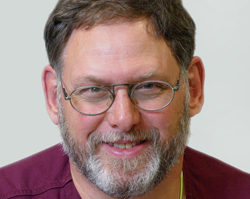 |
Tom Heuke, D.D.S. |
If new ideas never reach the public domain, has anything really been discovered?
Thomas Heuke, D.D.S., clinical associate professor for the UNMC College of Dentistry (COD), asks himself that question everyday.
“Nearly everything I work on at the COD translates into patient care in some way to solve a certain problem,” Dr. Heuke said. “I assume that if I think something could be improved; I’m sure there are other dentists who could benefit from the innovation and improve patient care.”
On Oct. 1, Dr. Heuke will join other UNMC inventors in the Durham Research Center Auditorium for UNeMed’s 2009 Research Innovation Awards. The ceremony, which will recognize inventors for their new inventions, patents and licensed technologies, begins at 4 p.m. A reception will follow in the atrium.
Dr. Heuke has developed a novel tool for dental and oral surgery that could change the standard for dental impressions, an essential step in a variety of procedures. Current systems that aid in dowel pin placement require expensive and complex equipment.
|
|
“Dr. Heuke is living proof that innovation comes from finding new solutions to everyday problems,” said Joe Runge, licensing specialist for UNeMed.
The I.O.G. is a classic example of a simple and elegant solution to a not-so-simple problem, said Bill Hadley, a Crieghton University law student and UNeMed intern who helps evaluate, market and license inventions made at UNMC.
Dr. Heuke knows a great idea doesn’t mean instant commercialization.
“I’m pleased that UNeMed offers assistance to researchers to market their inventions,” he said. “Association with UNeMed gives instant credibility to my idea when companies inquire about it.”
|
Dr. Heuke encouraged fellow researchers to consult with UNeMed on their inventions.
“Anytime you make something you can’t buy or no one else has or uses, that’s innovation,” he said.
The ultimate goal, Dr. Heuke said, is to pass on his inventions and share his knowledge with the dental profession or any field that may benefit.
“I hope to make technological contributions that help future researchers, so they can pick up where I left off,” he said. “I didn’t travel very far in life, but some people say I traveled a lot further than I should have traveled.”